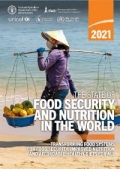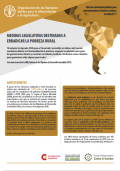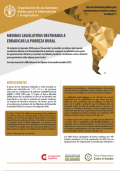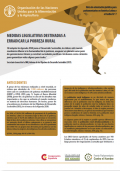Documents

Ces dernières années, plusieurs grands facteurs sont intervenus qui font que le monde n’est plus en voie de mettre un terme à la faim et à la malnutrition sous toutes ses formes d’ici à 2030. Les difficultés n’ont fait que grandir en raison de la pandémie de covid-19 et des mesures qui ont été prises pour l’endiguer. Le présent rapport contient la première évaluation mondiale de l’insécurité alimentaire et de la malnutrition pour l’année 2020 et donne une idée de ce à quoi ressemblerait la faim en 2030, dans un scénario encore compliqué par les effets prolongés de la pandémie...

Full list of laws approved by LAC Parliamentary Fronts in the pre-pandemic period (2009 - 2019) for Argentina, Bolivia, Brazil, Chile, Colombia, Costa Rica, Dominican Republic, Ecuador, El Salvador, Guatemala, Haiti, Honduras, Mexico, Nicaragua, Panama, Paraguay, Peru and Uruguay. [Available in Spanish only]

To achieve the SDGs in Latin America and the Caribbean, prosperous and inclusive rural territories are necessary: 78 percent of the 169 targets of the Sustainable Development Goals depend exclusively or mainly on actions undertaken in rural areas of the world. This document will address: i) the obligations of the States for the eradication of poverty, ii) proposals for legislative measures to eradicate rural poverty, and iii) parliamentary actions necessary to promote legislative and political measures for the eradication of rural poverty, and the experience of the "Parliamentary Front Against Hunger in Latin America and the Caribbean".

The inclusion of the Right to Food in the constitution not only complies with international provisions and obligations, but also enables the judicial control of all national legislation that is incompatible with it and establishes the right to reparation for those who have violated their access to feeding. This document will cover:-The regional and international framework that serves as the basis for the development of this constitutional right in Latin America and the Caribbean.-The obligations of the states that correspond to their observation.-A regional comparison of those countries that constitutionalize the Right to Food.

Food and nutrition security and the right to adequate food are multidimensional and cross-sectoral in nature. Their realization cuts across economic, social, cultural, environmental and political life and is intrinsically linked to that of other human rights, such as the right to water, the right to property, access to land and other productive resources, the right to health, the right to decent work and fair pay, among others.A framework law provides a legislative structure that brings together under one governing law, different sectoral disciplines, as well as the legal grounds for organizing the multiple state actors responsible for...

